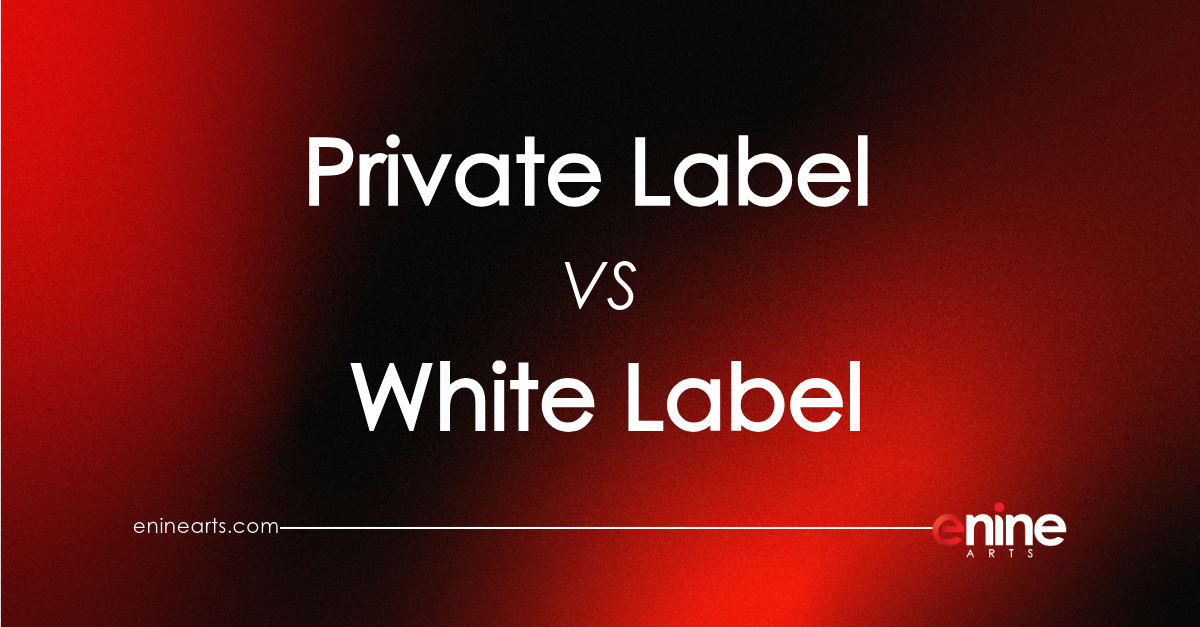Have you ever wondered what really sets white label vs private label products difference you need to know ? If you’re a business owner, entrepreneur, or curious consumer navigating the ever evolving world of product branding and reseller products, you’re not alone. These two terms often appear interchangeably in conversations around manufacturing and retail but they represent very different strategies when it comes to control, customization, and long term brand value.
Understanding the distinction between private label and white label can be a game-changer, especially if you’re looking to build a brand, expand your product line, or streamline your operations through drop shipping or partnering with wholesalers. Whether you’re dreaming of launching your own skincare line, packaging your unique family recipe into jars, or just exploring how contract manufacturers help businesses scale, this blog will break it all down for you.
In the sections ahead, we’ll guide you through the essential differences, benefits, and challenges of each approach helping you make smarter, more profitable decisions for your business. Ready to discover which model best fits your vision? Let’s dive in.
1. Understanding the Basics
If you’re diving into the world of product branding and partnerships, you’ve likely come across the terms private label and white label. While they may sound similar, they serve very different business purposes and choosing the wrong one could steer your brand in an unintended direction.
So, what do these terms really mean? And how can you tell which one is the best fit for your goals?
Let’s break them down.
What is a Private Label?
A private label product is one that is manufactured by a contract manufacturer but sold under your brand name. You, as the business owner, have significant control over the product specifications, including formulation, ingredients, features, and even the packaging and label design.
Think of it like this: You bring your family recipe for an apple pie to a professional kitchen. They mass-produce it for you, but everything from the crust design to the branding reflects your vision.
Key features of private label products:
- Custom product specifications and packaging
- Ownership of your brand name
- Exclusive formulations or designs
- More upfront investment, but higher profit margins
What is a White Label?
On the flip side, white label products are generic products created by a manufacturer that multiple businesses can rebrand and sell as their own. The product itself stays the same—you just apply your logo and branding.
It’s like buying a pre made apple pie and putting your bakery’s sticker on the box. You didn’t tweak the recipe, but it’s ready to go and easy to scale.
Key features of white label products:
- Faster time to market
- Limited or no control over product formulation
- Lower startup cost
- Ideal for reseller products or testing new markets
Private Label vs. White Label: The Core Difference In short:
- Private Label = Customization and ownership
- White Label = Convenience and speed
Understanding these foundational differences helps you better align your strategy with your long-term business goals. Whether you’re dreaming big or starting small, knowing the basics is your first step toward making an informed, profitable choice.
2. Ownership and Customization
When it comes to building a brand that truly reflects your identity, ownership and customization are game-changers. This is where private label and white label take very different paths.
Private Label: Full Creative Control
If you want to be hands-on with every detail from the formula to the label design—private label products give you that freedom. You’re not just selling a product; you’re shaping its identity.
Key areas of control include:
- Product specification: Ingredients, materials, or features are tailored to your vision.
- Packaging: Everything from the jar to the box reflects your brand aesthetic.
- Label design: Your logo, colors, and messaging shine through.
This flexibility allows for a unique product that can stand out in crowded markets.
White Label: Simplicity Over Specificity
With white label products, the core product is pre-made, which limits customization. You get to brand it as your own, but the ability to tweak product specifications or packaging is minimal or non-existent.
This model is ideal if:
- You’re testing a market before committing to full customization.
- You want to focus on direct sales without manufacturing complexities.
The Big Question: How much control do you really want?
If your vision includes a differentiated product with a story, a private label may be your path. If you prioritize speed and simplicity, white label has clear advantages.
3. Time to Market and Setup Effort
Let’s talk speed because in today’s fast-paced market, timing can make or break a launch.
White Label: Lightning Fast Setup
Need to hit the ground running? White label products are ready-made and often require minimal setup. After selecting a product, all that’s left is applying your branding—making it perfect for businesses needing a quick turnaround.
Advantages include:
- Minimal R&D or development time
- Pre-tested product performance
- Fast production and delivery timelines
This is especially useful in drop shipping models, where logistics are streamlined and efficiency is king.
Private Label: Slower, But Worth the Wait
With private label products, the timeline is longer but you gain a tailored result. Customizing product specifications or packaging takes time, often involving:
- Prototyping and sampling
- Adjustments based on feedback
- Finalizing contract manufacturer agreements
While this may delay launch, it positions your brand with a more unique offering.
Time vs. Customization: What’s Your Priority?
Ask yourself: Are you building a brand for the long haul, or entering the market to test demand? Your answer determines which model fits your pace.
4. Profit Margins and Pricing Power
Let’s talk numbers because at the end of the day, profitability fuels your growth.
Private Label: Higher Investment, Greater Reward
With private label products, you often face higher initial costs due to customization, branding, and sometimes mass production requirements. But that upfront investment gives you:
- Greater pricing power
- Stronger brand positioning
- The ability to set premium prices
If your product is unique, your audience is willing to pay more.
White Label: Lower Costs, Lower Margins
White label solutions typically have lower costs, especially when sourced from wholesalers. But the trade-off? You’re likely competing with other businesses selling the same product often leading to:
- Price wars
- Slimmer profit margins
- Less room to scale premium pricing
This model works well for high volume, direct sales businesses where margins can be made up in quantity.
Which Margin Fits Your Model?
If you’re ready to build value into your brand and increase perceived product worth, private labels offer the edge. But if cash flow is a priority, white label can be a smart, lean entry point.
5. Ideal Use Cases and Business Models
Not all brands have the same goals and not all models fit the same business type. Understanding where private label and white label shine can help you make a smarter move.
When to Choose Private Label:
- You have a unique family recipe or idea to protect
- Brand differentiation is your competitive edge
- You want to own the entire customer experience
Common industries include:
- Health and wellness
- Beauty and skincare
- Food and beverages
- Specialty retail
When White Label Makes More Sense:
- You’re starting out with minimal capital
- You want to launch quickly with reseller products
- You’re focusing on drop shipping or eCommerce
Popular among:
- Tech accessories
- Supplements
- Home goods
- Print-on-demand apparel
Real-Life Example: Apple Pie
Imagine selling apple pies. With white label, you’re rebranding a generic pie from a bakery. With a private label, you use your family recipe crafted to perfection and control every detail, from cinnamon blend to packaging style.
Choose your path based on the story you want to tell and the control you want to keep.
6. Risks and Challenges
Every opportunity comes with risk. And the choice between private label and white label is no exception.
Private Label Risks:
- Higher upfront costs and inventory investment
- Product development delays
- Greater reliance on a single contract manufacturer
- More regulatory responsibility, especially in food, health, and beauty
White Label Risks:
- Limited control over product quality
- Harder to differentiate in saturated markets
- Risk of multiple sellers offering identical products
- Branding restrictions depending on the supplier
Mitigating the Risks
Whether you’re working with wholesalers or a private manufacturer, due diligence is crucial. Vet your suppliers, test your products, and ensure quality standards match your brand promise.
Ask yourself: Are you ready to take full ownership or do you need a simpler, safer entry?
7. Scalability and Long Term Growth
What happens when your business starts to take off? Can your model grow with you?
Private Label: Built for Longevity
With private label, you own the brand experience, making it easier to build customer loyalty and expand your line. As your brand grows, so does your control over:
- Product extensions
- Seasonal releases
- Pricing strategies
This model supports businesses looking to scale sustainably.
White Label: Quick Wins, Limited Depth
While white label offers fast entry, long-term growth can be tricky. Since other sellers might use the same product, it’s harder to stand out or justify higher pricing. You’re also limited in creating brand story or identity depth.
That said, white label is a great stepping stone—many businesses start here, gain traction, and transition to private labeling later.
Thinking Long-Term?
If your goal is a strong, recognizable brand that consumers trust and love, private label is the natural next step.
8. How to Decide What’s Right for Your Business
Still unsure which route to take? Let’s simplify the decision.
Ask Yourself These Questions:
- Do I want full control over product specification and branding?
- Am I able to invest time and money upfront for long-term gains?
- Is speed to market more important than product uniqueness?
- Will my customers care if the product is also sold by others?
A Quick Comparison:
| Feature | Private label | White Label |
| Customization | High | Low |
| Branding Flexibility | Full Control | Limited |
| Speed to Market | Slower | Faster |
| Initial Investment | Higher | Lower |
| Longterm value | Strong brand Equity | Moderate |
Final Thought
Both private label and white label have their strengths. It all comes down to your vision, resources, and goals. Whether you’re building a unique product from scratch or leveraging a ready made solution to test the waters, the key is to stay aligned with your brand’s purpose.
Take the time to evaluate your priorities, and make the move that supports not just your launch, but your legacy.


